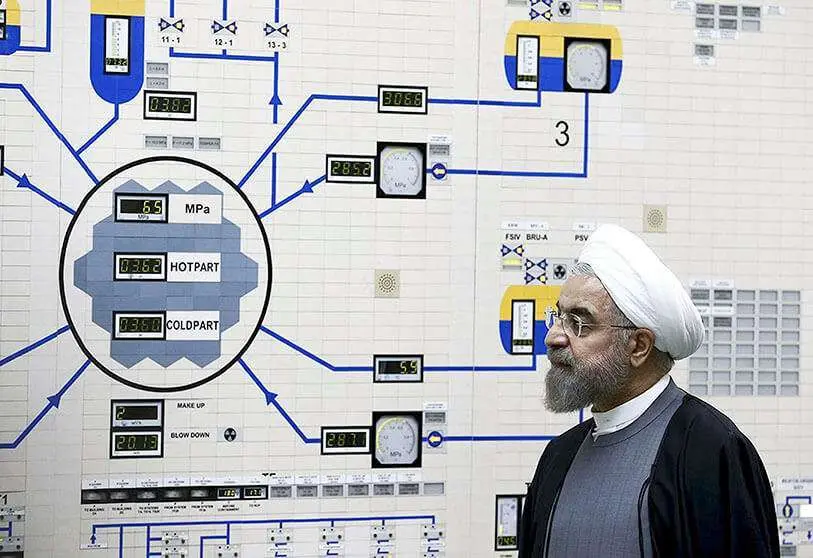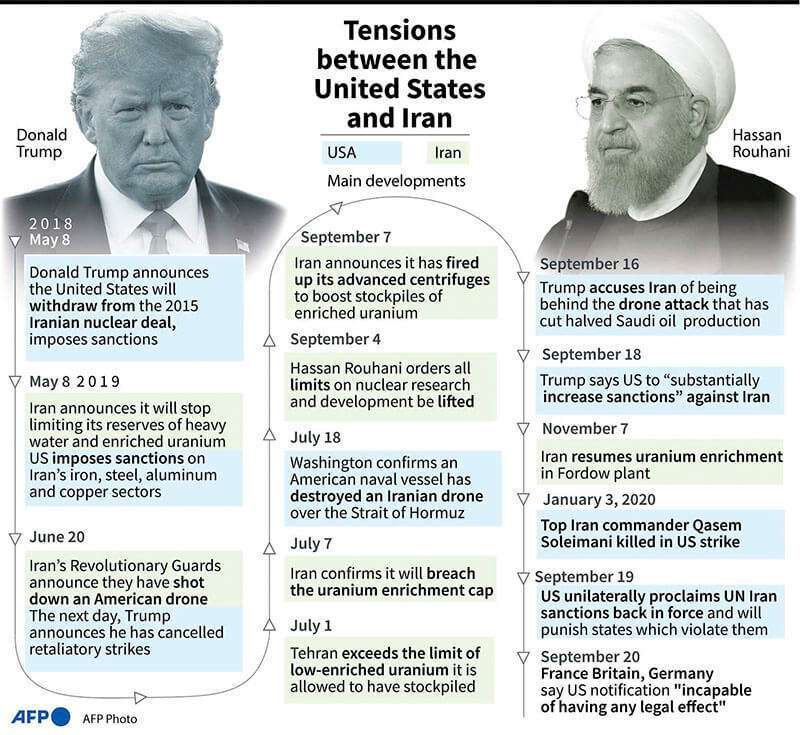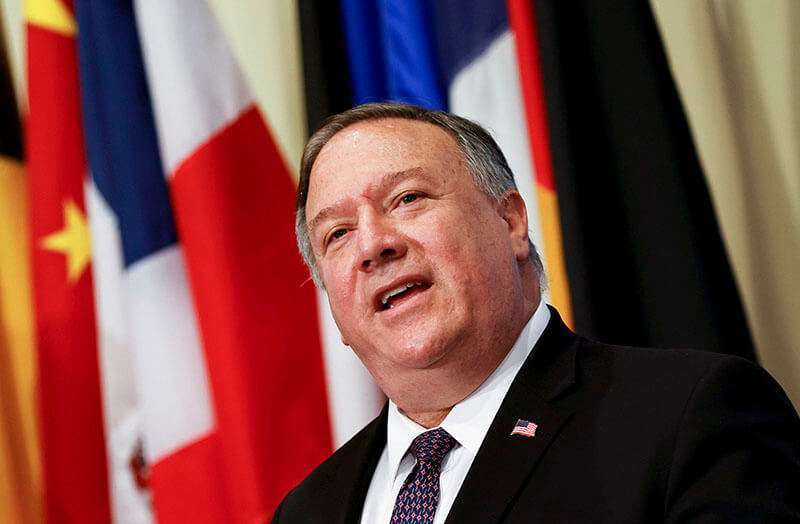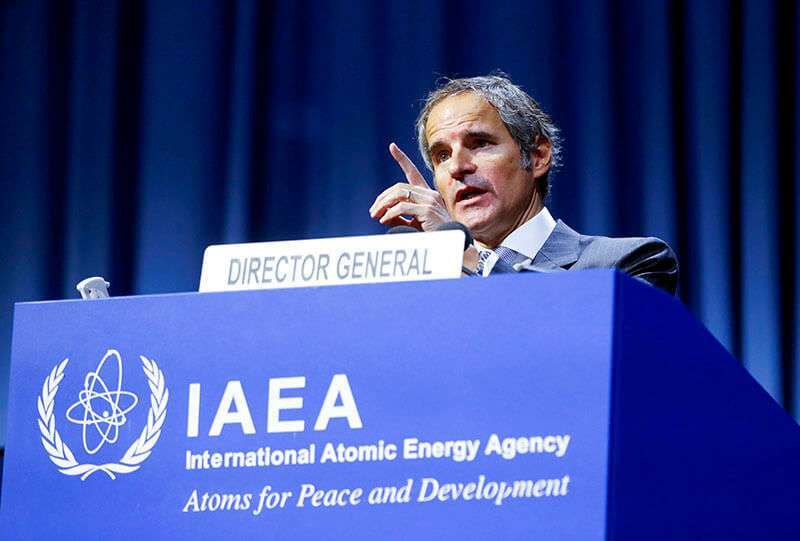US to impose sanctions on entities linked to Iran's nuclear programme

The sanctions that the United States has imposed on more than two dozen people and entities involved in Iran's nuclear, missile and conventional weapons programmes come into force on Monday, according to a senior US official quoted by Reuters news agency.
This decision, taken unilaterally by the Trump Administration, conflicts with the nuclear agreement signed in 2015 by the United Nations and from which Trump withdrew in 2018. Speaking on condition of anonymity, the official pointed out to Reuters that Teheran could have sufficient fissile material for a nuclear weapon by the end of the year and that the Islamic Republic has resumed cooperation with North Korea in the field of long-range missiles and nuclear weapons.

Washington's more than two dozen sanctions targets include those involved in Iran's conventional, nuclear and missile programmes.
"Illegal and ineffective" were the words used by the Iranian authorities to describe this reinstatement of UN sanctions by Washington and rejected by the Security Council (SC). The Persian foreign ministry warned that this step poses a "threat to international peace and security and an unprecedented threat to the UN and the SC. In a statement issued on Sunday, the Iranian Foreign Ministry said that Washington "is not only flouting all the principles of international law and the UN Charter, but is also openly challenging the international community through intimidation".
Iranian President Hassan Rohani warned that "if the United States wants to continue its harassment and take a practical step - to reinstate sanctions - it will be met with a firm response from Iran". The commander-in-chief of the Iranian Revolutionary Guard, Hosein Salami, is sure that Iran is capable of "destroying the interests of the United States and capturing its bases" in the Middle East. The Iranian parliament is immersed in the process of preparing a bill which, in the event that international sanctions are re-established, would allow the Persian country to cease to implement the Additional Protocol to the Non-Proliferation of Nuclear Weapons (NPT), which allows IAEA inspections without prior notice at any facility.
For his part, the US Secretary of State, Mike Pompeo, said, according to Efe, that in the coming days they will announce a series of measures to "strengthen the application of UN sanctions and to hold violators accountable", calling attention to the countries that oppose the establishment of sanctions.

Limiting Iran's regional influence is the main aim of these sanctions and comes one week after the signing of the 'Abraham Accords' between the United Arab Emirates, Bahrain and Israel to normalise ties between the two Arab countries and the Jewish country. The Trump Administration suspects Iran of seeking nuclear weapons, something that Teheran denies, and Monday's punitive measures are the latest in a series that seek to hinder Iran's atomic programme, which Israel-which is a Washington ally-takes as a threat.
It should also be borne in mind that on October 18 the UN embargo on conventional weapons to the Islamic Republic, which was included in the 2015 nuclear agreement, expires. The United States has therefore attempted to move to maintain the sanctions and thereby warn foreign players (the US entities are already banned from this trade) that if they buy or sell weapons to Iran they will face US sanctions. These sanctions promoted by the United States provide for an executive order against all those who buy or sell conventional weapons to Iran.
In August Washington launched a procedure before the UN to reinstate these sanctions, but the majority of the SC-including the other powers with the right of veto-considered that the US could not use this mechanism of the nuclear pact. Germany, France and the United Kingdom, members of the nuclear agreement, again contested the United States' unilateral decision and maintained that their measures "have no legal effect".
On Friday, London, Paris and Berlin said at the SC that the easing of UN sanctions on Iran would continue beyond Sunday, despite Washington's assertion.
China's ambassador to the United Nations, Zhang Jun, and Russia's ambassador to the UN, Vassily Nebenzia, described the US measure as "illegitimate" and said that they will continue with the policy of increasingly lax measures for Iran.

Also, the UN Secretary General, António Guterres, told the SC that he cannot act on the US statement that the UN sanctions had been re-imposed because it was not clear whether they had been resolved.
"It is not up to the Secretary-General to proceed as if there is no such uncertainty," Guterres said on Saturday. Since the United States' exit from the agreement in 2018, Iran has gradually violated the core limits of that agreement, according to the International Atomic Energy Agency (IAEA), including the size of its enriched uranium stocks, as well as the level of purity at which it was allowed to enrich uranium.
The Vienna-based agency said that Iran had begun to violate the limits of the agreement since the US withdrawal.








